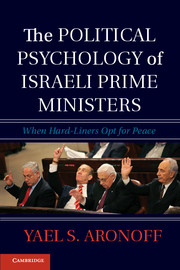Book contents
- Frontmatter
- Dedication
- Contents
- Preface
- Acknowledgments
- 1 Introducing the Conceptual Framework
- 2 Yitzhak Shamir: Once a Hawk, Always a Hawk
- 3 Benjamin Netanyahu: Battling the World
- 4 Ariel Sharon: From Warfare to Withdrawal
- 5 Yitzhak Rabin: From Hawk to Nobel Prize Peacemaker
- 6 Ehud Barak: All or Nothing
- 7 Shimon Peres: From Dimona to Oslo
- 8 The Psychology of Political Conversion
- Appendix A Summary of Key Factors and Findings
- Appendix B Interviews Conducted by the Author
- Bibliography
- Index
- References
7 - Shimon Peres: From Dimona to Oslo
Published online by Cambridge University Press: 05 June 2014
- Frontmatter
- Dedication
- Contents
- Preface
- Acknowledgments
- 1 Introducing the Conceptual Framework
- 2 Yitzhak Shamir: Once a Hawk, Always a Hawk
- 3 Benjamin Netanyahu: Battling the World
- 4 Ariel Sharon: From Warfare to Withdrawal
- 5 Yitzhak Rabin: From Hawk to Nobel Prize Peacemaker
- 6 Ehud Barak: All or Nothing
- 7 Shimon Peres: From Dimona to Oslo
- 8 The Psychology of Political Conversion
- Appendix A Summary of Key Factors and Findings
- Appendix B Interviews Conducted by the Author
- Bibliography
- Index
- References
Summary
I’m willing to go by air, land, sea, even to swim, to achieve peace.
– Shimon Peres, August 24, 2009Peres has done more for the cause of peace in the Middle East than just about anybody alive.
– U.S. President Barack Obama, June 14, 2012Shimon Peres’s change from a hard-liner to a peacemaker is often captured by the phrase, “from Dimona to Oslo.” Peres was one of the initiators of Israel’s nuclear military facility in Dimona in the 1950s, but he ultimately received a Nobel peace prize for signing the Oslo Accords with Yasser Arafat in 1993. Peres moved from relying on deterrence alone, to believing that creating mutual, shared economic interests were as important as deterrence, and he has established the Peres Center for Peace to foster that vision of peace through economic cooperation. Peres’s changes in attitude are reflected in the titles of his books: in 1970 he wrote David’s Sling, in which he emphasized his primary role in Israel’s defense buildup. He wrote that Israeli declarations of a desire for peace are perceived as a sign of weakness by the Arabs, who want to destroy Israel. In contrast, in the late 1980s and early 1990s, he wrote books with the titles Battling for Peace and The New Middle East, emphasizing Israel’s need to take the initiative in making peace with its neighbors. Peres believed that the world had changed and that territory was no longer as important for strategic depth. Whereas previously more land would afford more time for preparation and lessen risks to main cities during a tank attack, he concluded that land no longer fully protects one from nuclear weapons, missiles, and terrorism and that therefore diplomacy was the best way to achieve national security.
Until the early 1980s, Peres had largely ignored the Palestinians and had adamantly opposed negotiating with the PLO for the establishment of a Palestinian state. After serving in the Ministry of Defense for many years, Peres was nominated its director general in 1953, at the age of twenty-nine. He also served as deputy minister of defense from his first year as a Knesset member in 1959 until 1965. After Israel’s withdrawal from Lebanon in 1982, he perceived Israel to be sufficiently strong to negotiate Palestinian issues, and he thought that the war had shown the futility of armed conflict.
- Type
- Chapter
- Information
- The Political Psychology of Israeli Prime MinistersWhen Hard-Liners Opt for Peace, pp. 149 - 172Publisher: Cambridge University PressPrint publication year: 2014



